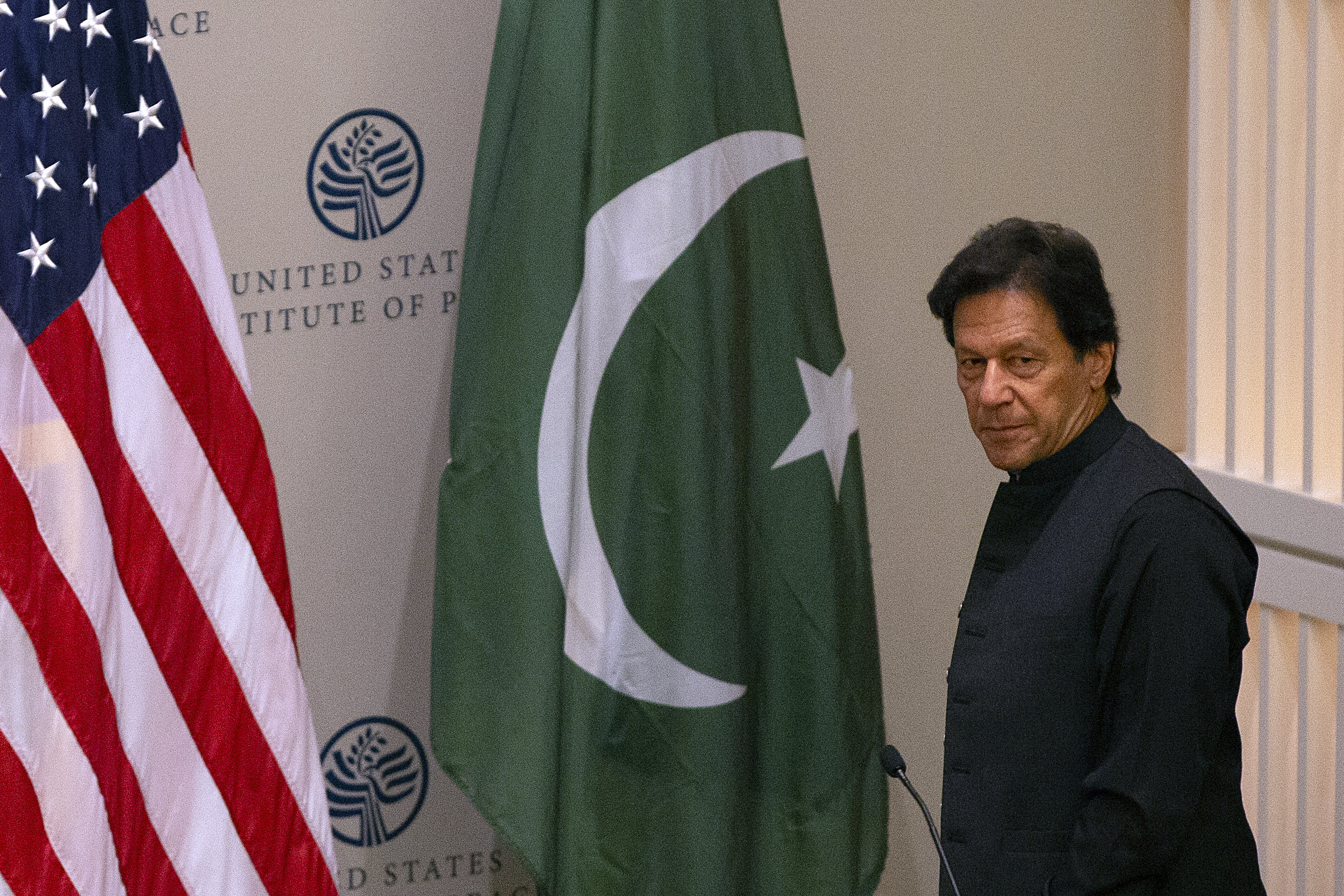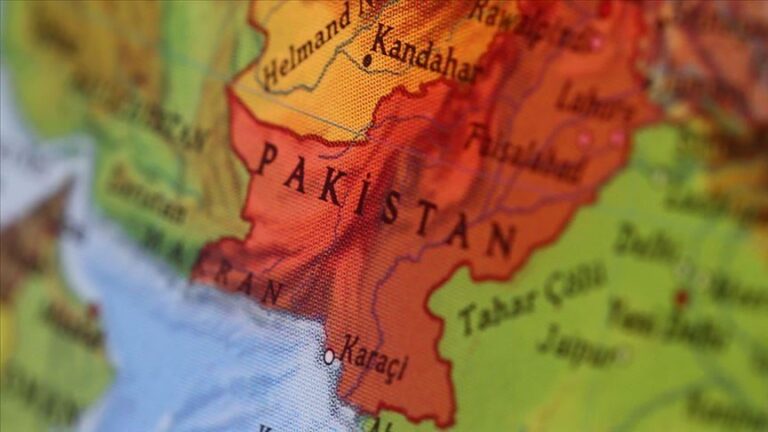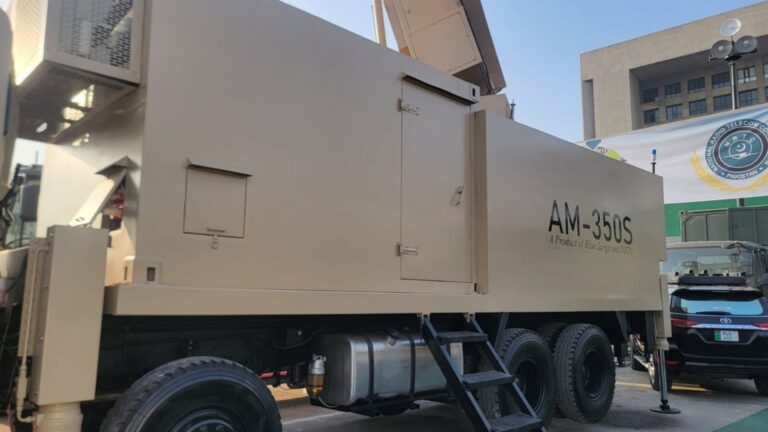
Pakistani Prime Minister Imran Khan arrives to speak at the United States Institute of Peace (USIP) in Washington, DC, on July 23, 2019. (Photo by Alastair Pike / AFP)
Ambassador Aizaz Chaudhry
By most counts, the recent official visit of Prime Minister Imran Khan to the United States (21-23 July 2019) is a great success. For the past three years, Pakistan’s relationship with the United States, the pre-eminent power of the world, was in doldrums. There was a desire on both sides, so it seems, to avoid a complete rupture. After all, Pakistan and the U.S. have enjoyed sustained periods of engagement, albeit interrupted by spells of estrangement. The vibes from the Prime Minister’s meetings with the U.S. President and other American leadership in Washington are mostly positive. The military leadership accompanying the Prime Minister further reinforced our messaging. The Pakistani-American diaspora also came out in large numbers to welcome the Prime Minister. Is the relationship, then, on course for a reset? Foreign Minister Shah Mahmood Qureshi certainly seems convinced that “a foundation” for this has been built.
So far so good, but some key questions remain. How would it actually pan out? Will the U.S. restart the broad-based relationship that Pakistan desires? Or will this be a temporary phase limited to cooperation in securing U.S. exit from and peace in Afghanistan? How will the upturn in U.S. relations with Pakistan go down with the former’s relations with India, and how will Pakistan’s relations with China be impacted by the reset, if and when it happens? These and many other questions would consume debates in the weeks ahead, but it is important to first understand the global and regional context in which the visit took place.
The geometry of international relations has transformed at a breathtaking pace over the past few years. China’s meteoric rise has challenged the prevailing balance of power in Asia. President Trump’s Indo-Pacific Strategy is largely perceived as a China-containment policy. The U.S. has been deepening its strategic partnership with India, preparing it as the extra regional anchor for U.S. policy in the so-called Indo-Pacific region. There are growing concerns that a new Cold War could set in. Elsewhere in Pakistan’s neighborhood, Afghanistan remains in turmoil while efforts are afoot to secure peace there. Tensions between Iran and its Arab neighbors in the Gulf as well as with the U.S. have kept the region on tenterhooks. President Trump’s unique style of governance, particularly his tendency to announce policy decisions through tweets, has added to the anxiety. There is a great deal of unpredictability in how and what role the U.S. would play in re-shaping the new world order. It is in this backdrop that Pakistan’s present and future relationship with the U.S. should be evaluated.
Another relevant factor is the history of Pakistan-U.S. relations, which has seen ups and downs like a roller coaster. Yet, despite misgivings, there has always been a desire on both sides to maintain the relationship or at least find that common space where both feel that their interests are being served.
So, when Prime Minister Imran Khan landed in Washington DC on 21 July 2019, what did he expect of the relationship? It appears that it was as clear to him as it was to most political analysts here in Pakistan that striking a personal rapport with the U.S. chief executive would be of crucial importance. President Trump has the reputation of following his own instincts and not necessarily the official briefs, which were mostly negative about Pakistan. For the U.S., it was important that Trump sees the other picture of Pakistan, different from the one that Pakistan-bashers and Indophiles have painted in the U.S. From what we have seen on news reports, this objective has been achieved to a considerable extent. Is it only optics or would there be substantive improvement in the relationship, only time will tell, but a first good step it certainly is.

The most important piece of conversation was of course about Afghanistan, where a ray of hope has been kindled thanks to the ongoing peace process. There is now a nation-wide consensus in Pakistan that a peaceful, stable and prosperous Afghanistan is in the interest of Pakistan and our region. Pakistan’s leadership has, therefore, rightly decided to facilitate the peace process in Afghanistan. The U.S. and the Taliban have held a series of conversations whereby the U.S. would withdraw its forces from Afghanistan in return for Taliban guarantees that Afghan soil would not be used against the U.S. or any other country. U.S. is publicly appreciating Pakistan’s support in facilitating these talks. However, there are still several pieces of the puzzle that must also fall in place to secure a lasting peace in Afghanistan. All factions of the Afghan polity must be made to realize that they have to co-exist. Another crucial requirement is some kind of mechanism to ensure that the ceasefire holds. More critically, there should be consensus amongst all major and regional powers to give peace a chance in Afghanistan, to not use Afghan soil for proxy wars. For Pakistan, this regional consensus is a critical factor, given that India has been using Afghan soil to create instability in Pakistan. Pakistan and the U.S. would need to closely work together, with other relevant powers, especially China, Russia and Iran, to secure the much-needed peace in Afghanistan.
A prominent take-away from the meetings in Washington, which in fact stole the show, was an offer by President Trump to mediate on the Kashmir dispute, which he says was requested of him by Prime Minister Modi himself. Although Indian Ministry of External Affairs was quick to deny that India made any such request for mediation, President Trump’s comments have generated a debate both in India and Pakistan. Prime Minister Imran Khan, of course, welcomed the offer, saying that over a billion people of South Asia would pray for the success of the mediation. Foreign Minister Qureshi explained it well, that India insists on bilateral track but then never engages in any meaningful talks on Kashmir. Mediation, therefore, is the most feasible option. Not that this would resolve the Kashmir issue immediately, but it would certainly put additional pressure on India to address this lingering conflict that has prevented peace in South Asia.
The Prime Minister’s outreach to the U.S. Congress was also important in order for the U.S. to see more clearly that Pakistan itself was a victim of terrorism and has done more than its share in fighting this menace. With the U.S. having declared BLA as a terrorist entity, one would hope that the U.S. would press India to give up its belligerent attitude towards Pakistan, minorities in India, and the Kashmiris. The U.S. must also show understanding for the efforts Pakistan is making to comply with FATF requirements.
There has been speculation in certain media circles that the changed U.S. attitude could be an attempt to wean Pakistan away from China. This view overlooks the fact that Pakistan has enjoyed time-tested relationship with China and would never want to make its relations with China and the U.S. a zero-sum game. Pakistanis take great pride in having served as a bridge between China and the U.S. nearly five decades ago and could still play the same role.
One area of great promise is economic, commercial and investment cooperation between Pakistan and the U.S. Corporate America has historically been present in Pakistan. Every government in Pakistan has always welcomed American companies to invest in Pakistan.
As for recent U.S.-Iran standoff, Pakistan has been quite forthright in expressing its view that a peaceful solution needs to be found for the ongoing crisis as war could have disastrous consequences for the entire region and all parties.
If both sides maintain the cordiality that we have seen in Imran Khan’s visit to Washington, a reset is certainly possible. Moving forward, it would be important for both sides to stay positively engaged. To this end, our preference should be to institute a broad-based structured dialogue on issues ranging from economy to security to people to people contacts. We need to consolidate the common ground that helps make the relationship beneficial for both sides.
Amb. Aizaz Chaudhry is the Director General of the Institute of Strategic Studies Islamabad, former Foreign Secretary of Pakistan and former Ambassador to the U.S.







